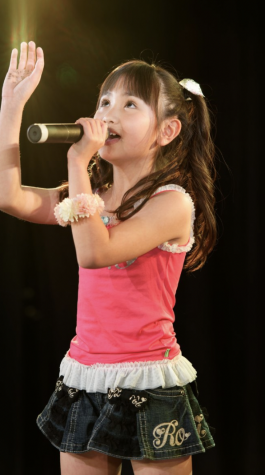What Lies Beneath Japan’s Population Crisis
A young singer steps onto the stage to pursue her dream. As the lights flash, the passionate roar of her fans’ cheers and claps echo throughout the room, and she begins to call out her joyful melodies. Her hair is neatly pinned up into a ponytail and her bangs rest on her forehead. Her black blouse hangs over her leather mini skirt. To complete the look, she wears velvet, black knee-high boots with high heels, black thigh-high socks, and a choker. Her name is Yune Sakurai, an 11-year-old girl from Japan. And the roars and cheers from the crowd… predominantly come from middle-aged men.
Since 2008, Japan’s population has been on a rapid decline. While the population decline is talked about, headlines in the U.S. only cover the tip of the iceberg. The real reason behind this growing issue is gender inequality and the way that women are treated in the culture of Japan, seen first hand through Sakurai.
At first glance, places like Tokyo may seem stunning with unique fluorescent lights, towering buildings shining above bustling streets, and anime and video game characters displayed across massive screens. However, within these shows and video games lies a disturbing pattern.
This unsettling pattern is also unfortunately seen in Sakurai, a young girl with big dreams. Singing and performing on stage is her passion. “I’ve always dreamed of standing on stage at the Budokan,” Sakurai said. Her songs often resonate with romantic fantasies: love, running away, and never giving up. She has been training to become an idol since the age of eight and releasing songs since age ten. To interact with her fans, she runs live streams in her living room weekly as her mother, Chihiro, sits across the room and removes any inappropriate messages that may come her way.
Her fans, who are primarily adult men, fawn over her and gush about her talent. Koji, a Yune fan, was asked why some men were drawn to these idols. He responded, “I personally think the majority of them are single with no children. So they feel like they’re watching their own daughter grow up.”
Yune’s youth, talent, and innocence are what make her so appealing to men. And unfortunately, she is only one of many girls signed under the idol industry in Japan. However, this industry isn’t the only aspect of Japanese pop culture that is catered to the male gaze. Women in media are often depicted as submissive. They are seen as characters who serve to comfort the males through a soft, cute voice and a sensitive demeanor. These characters and celebrities are often infantilized while young girls are fetishized.
Minori Kitahara, a journalist for the Japan Times, claims, “a girl’s job is to always smile and comfort men. Some people say that the girls have chosen this, so there’s nothing wrong with the ‘little girl’ fantasy. If outsiders like me speak out against it, we get an aggressive backlash.” This uninvited treatment of women in Japan has its consequences, namely, the population decline.
One factor of the decline is that Japan’s birth rate is less than optimal. In an attempt to understand this fall in the birth rate, a survey by the Japan Family Planning Association found that “45% of women aged 16-24 were not interested in or despised sexual contact.”
Another survey conducted in 2011 found that “61% of unmarried men and 49% of women aged 18-34 were not in any kind of romantic relationship, a rise of almost 10% from five years earlier.”
The disinterest in marriage can actually be traced back to the history of Japan and the amount of suffering Japanese women have experienced due to the oppressive traditional gender roles. For example, during the Tokugawa period, a wife’s adultery could be punishable by death. However, this law did not apply to Japanese husbands.
During World War II, Japan forced Asian women into sex work, calling them “comfort women.” The system spread across Asia and would remain in place for 13 years.
Unfortunately, this misogyny still lurks beneath the surface of the island’s culture. Even in Japan’s modern culture, men are valued more than women since they provide the income for their families while the mothers typically stay home to take care of the kids. For Japanese mothers, it is very difficult to return to the workforce after having children. Even if a mother does manage to land a job, there is no guarantee that her pay will be as high as men with the wage gap placed at 24.5%, the third-largest gender wage gap in the world. This already dreadful reality is worse for single moms. 80.6% of single mothers in Japan are employed, yet their annual income is less than half of the median income for the population.
Ayano, a single mother struggling to make ends meet, works as a model and Instagram influencer. In an interview with Asian Boss, she said, “Single mothers are still quite rare in Japan. Regardless of the reason they gave birth, all single mothers face hardships from the harsh shaming culture of society. And this culture makes life incredibly difficult for our children and for ourselves, the single mothers.“
As for the workplace, Japanese women are faced with yet another challenge: sexual harassment and workplace discrimination. #KuToo is an ongoing movement combating both of these issues. Yumi Ishikawa, writer, actress, and part-time worker founded the movement because of a workplace policy that required female employees to wear heels during shifts. Ishikawa collected almost 20,000 signatures to combat the policy, providing unquestionable evidence that the requirement was both uncomfortable for women and a safety hazard. Ultimately, Japan’s Health and Labor Minister, Takumi Nemoto, rejected her call, claiming the policy was necessary due to job expectations and social conventions.
Ishikawa writes in her book, “[Women] weren’t allowed to be angry. If we expressed our anger, we were suppressed by words such as ‘hysteria’, and we were told we wouldn’t be popular or wouldn’t be heard if we spoke like that.”
With that said, should we be surprised that Japan’s Institute of Population Social Security reported that 90% of young Japanese women reported staying single to be more preferable than getting married? Clearly, the harassment, gender inequality, and inability to fight back against it have drawn a serious barrier between men and women to the point where marriage is no longer an aspiration for the future.
It is unlikely that the idol industry will cease operation any time soon. Even if it were to disband, Japan would still have the same issues in its hands: deeply rooted gender inequality. And it is this imbalance, seen throughout the history of Japan, that has led to the population decline currently facing the nation.
Emily is a senior at Harriton. This is her second year writing for the banner. In her free time she loves to draw, listen to music, and hang out with friends....




